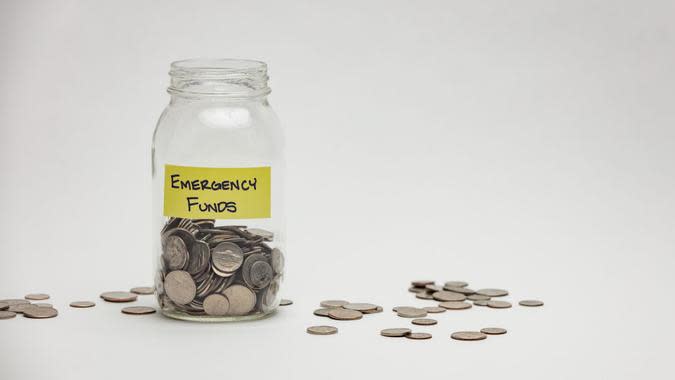9 Mistakes You’re Making With Your Tax Refund, According to Experts

In a GOBankingRates survey, 33% of respondents said they expect to receive a tax refund of more than $1,000 this year. And while some people intend to use that money for things like investing or paying off debt, others said they’ll probably use it to treat themselves.
Read: IRS Increases Gift and Estate Tax Exempt Limits — Here’s How Much You Can Give Without Paying
Learn: 6 Unusual Ways To Make Extra Money (That Actually Work)
Although it might be tempting to simply spend your refund once you get it, you might want to think twice before doing so. There are much wiser financial decisions you can make instead.
According to experts, these are the top mistakes people make with their tax refund — and what people should do with this money instead.

Splurging on Non-Essentials
“In my job as an IRS-registered tax preparer, I frequently see people making mistakes after receiving their tax refund, which can lead to financial difficulties,” said Hassan Sanders, tax expert and founder of Diabetic Insurance Solutions. “A common mistake is the desire to splurge on non-essential products or luxury.”
Spending some money on non-essentials isn’t necessarily a problem, but there’s such a thing as excess.
“While self-care is understandable, excessive and frivolous expenditure might jeopardize long-term financial stability,” said Sanders. “Individuals should find a balance, reserving a portion of their refund for enjoyment while prioritizing sensible financial decisions.”
See: This Is the One Type of Debt That ‘Terrifies’ Dave Ramsey
Find Out: Top 7 Countries with Zero Income Tax
Sponsored: Owe the IRS $10K or more? Schedule a FREE consultation to see if you qualify for tax relief.

Focusing on Instant Gratification
Similarly, many people treat their tax refund as a windfall instead of a strategic financial asset, said Tracy Cauley, CFA at VEM Medical. Rather than allocating the money toward long-term financial goals, they spend it on things that offer short-term gratification, like extravagant vacations or luxury items.
“This behavior can lead to financial instability in the long run, as it detracts from building a solid financial foundation,” said Cauley.
Read: The 7 Worst Things You Can Do If You Owe the IRS

Ignoring Other Financial Obligations
Using a tax refund to pay down existing debts is a smart financial strategy, but not everyone does this. Some will use the money to buy things they want instead of getting rid of debt, which could hurt their overall financial stability.
“Some people ignore utilizing their tax refund to pay off high-interest debts, such as credit card balances or loans,” said Sanders. “Neglecting these financial duties might result in greater interest payments over time, impeding overall financial growth.”
If you have existing debts, especially high-interest debts, you may want to consider putting a portion of your refund toward them.

Not Having a Plan
People who get a tax refund often don’t create a plan for how they want to use that money when it comes. This often leads to spending rather than saving or investing.
“Many individuals fail to prioritize important financial steps with their tax refunds, such as establishing an emergency fund, paying off high-interest debt, or investing for the future,” said Cauley. “To avoid these mistakes, it’s crucial to have a plan in place beforehand and allocate the refund towards goals that align with long-term financial stability and growth.”

Skipping the Emergency Fund
Experts suggest setting aside at least three months’ worth of living expenses in a secure account in case something happens and you need the money. You can use this money for emergencies, like a sudden medical expense or layoff at work.
If you receive a tax refund and don’t have an emergency fund, you might want to start saving up for one. You don’t have to do it all at once, but every little bit helps.
“One should set a realistic monthly savings goal, even if it’s just as little as $25, and automate transfers to a dedicated emergency fund savings account to cover 3-6 months of living expenses to weather unexpected events,” said Tracy Xu, director at BarkLikeMeow.
Interesting: Trump-Era Tax Cuts Are Expiring — How Changes Will Impact Retirees

Allowing Lifestyle Inflation
When you receive a large sum of money, such as from a tax refund, you might be tempted to use it to buy things you couldn’t otherwise afford. Perhaps you put the money toward a down payment on a new car. Or you use it to buy new furniture — potentially using a Buy Now, Pay Later plan.
Whatever the case, if you’re not careful, you could end up with lifestyle inflation. This is essentially what happens when your spending increases because your available funds do.
“Adjusting spending habits based on the temporary boost from the refund [can lead] to financial strain when it runs out,” said Xu.
It could also cause you to rack up debt to be able to afford these lifestyle changes once the refund is gone. This, in turn, can lead to greater financial issues down the road.

Ignoring Retirement Savings
Retirement might seem far away, but it’ll arrive sooner than you expect. If you receive a tax refund this year, you might want to consider dedicating a portion of it toward your retirement savings goals.
“Failing to invest the refund towards retirement [could] potentially jeopardize future financial security,” said Xu. “Start investing a portion of your income, even if it’s small, in retirement accounts or other long-term goals like a down payment. Prioritize contributing to employer-sponsored retirement accounts like 401(k)s with employer matching to maximize returns.”

Not Using Tax-Advantaged Accounts
Xu said that people who receive a tax refund often fail to explore tax-advantaged savings options that could benefit their overall financial situation.
“Explore options like IRAs, HSAs, and 401(k)s to reduce your taxable income and benefit from tax-deferred or tax-free growth,” she suggested. “Claim all eligible deductions and credits you qualify for by consulting a tax professional.”
If possible, max out your annual contributions to these tax-advantaged accounts. This will help you meet any long-term savings or retirement goals as well.

Avoiding Professional Help
Last but not least, if you’ve received a substantial tax refund, you might want to consult a qualified legal or tax professional about what to do with it. They can help you come up with a game plan that benefits you now and in the future.
“Consider working with a certified public accountant (CPA) or enrolled agent for personalized tax planning and optimization based on your unique financial situation,” said Xu.
More From GOBankingRates
This article originally appeared on GOBankingRates.com: 9 Mistakes You’re Making With Your Tax Refund, According to Experts